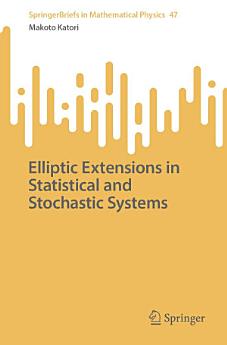Elliptic Extensions in Statistical and Stochastic Systems
Apr 2023 · SpringerBriefs in Mathematical Physics Book 47 · Springer Nature
Ebook
125
Pages
reportRatings and reviews aren’t verified Learn More
About this ebook
Hermite's theorem makes it known that there are three levels of mathematical frames in which a simple addition formula is valid. They are rational, q-analogue, and elliptic-analogue. Based on the addition formula and associated mathematical structures, productive studies have been carried out in the process of q-extension of the rational (classical) formulas in enumerative combinatorics, theory of special functions, representation theory, study of integrable systems, and so on. Originating from the paper by Date, Jimbo, Kuniba, Miwa, and Okado on the exactly solvable statistical mechanics models using the theta function identities (1987), the formulas obtained at the q-level are now extended to the elliptic level in many research fields in mathematics and theoretical physics. In the present monograph, the recent progress of the elliptic extensions in the study of statistical and stochastic models in equilibrium and nonequilibrium statistical mechanics and probability theory is shown. At the elliptic level, many special functions are used, including Jacobi's theta functions, Weierstrass elliptic functions, Jacobi's elliptic functions, and others. This monograph is not intended to be a handbook of mathematical formulas of these elliptic functions, however. Thus, use is made only of the theta function of a complex-valued argument and a real-valued nome, which is a simplified version of the four kinds of Jacobi's theta functions. Then, the seven systems of orthogonal theta functions, written using a polynomial of the argument multiplied by a single theta function, or pairs of such functions, can be defined. They were introduced by Rosengren and Schlosser (2006), in association with the seven irreducible reduced affine root systems. Using Rosengren and Schlosser's theta functions, non-colliding Brownian bridges on a one-dimensional torus and an interval are discussed, along with determinantal point processes on a two-dimensional torus. Their scaling limits are argued, and the infinite particle systems are derived. Such limit transitions will be regarded as the mathematical realizations of the thermodynamic or hydrodynamic limits that are central subjects of statistical mechanics.
Rate this ebook
Tell us what you think.
Reading information
Smartphones and tablets
Install the Google Play Books app for Android and iPad/iPhone. It syncs automatically with your account and allows you to read online or offline wherever you are.
Laptops and computers
You can listen to audiobooks purchased on Google Play using your computer's web browser.
eReaders and other devices
To read on e-ink devices like Kobo eReaders, you'll need to download a file and transfer it to your device. Follow the detailed Help Center instructions to transfer the files to supported eReaders.







